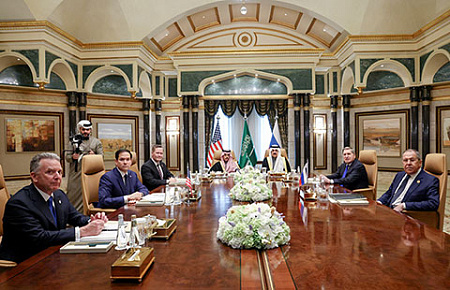
Russia and the United States continue the negotiation process. Recently, the delegations of the two countries met in Istanbul and discussed the prospects for normalizing the work of the embassies. And the ice in Russian-American relations began to melt after a meeting in the capital of Saudi Arabia, Riyadh. On February 18, the first talks in three years between high-ranking representatives of Russia and the United States took place there, which, according to Dmitry Peskov, the press secretary of the President of the Russian Federation, became the first step towards restoring Russian-American ties destroyed during the administration of Joseph Biden, and the first step in resolving the conflict in Ukraine. Both sides described the results of the meeting as “positive” and “encouraging.” The results of the negotiations and subsequent events, as well as statements by representatives of the parties, suggest that the first face–to-face meeting between Vladimir Putin and Donald Trump may take place there, in the Saudi capital.
Meanwhile, it cannot be said that the choice of Riyadh as the location of the first Russian-American meeting was clear to everyone, and the Russians were even perplexed, apparently due to the fact that Saudi Arabia’s image in our country has not been the best in recent decades. I still remember the days of the Cold War, when the kingdom was a staunch ally of the West and supported its anti-Soviet demarches, including in the global energy market. At that time, by pandering to its overseas ally, the kingdom was driving down world oil prices in order to deprive the Soviet Union of foreign exchange earnings and create economic difficulties for it. However, those days are long gone, and Saudi Arabia is not the same country it was decades ago.
King Salman, who came to power in January 2015, and his son Mohammed bin Salman, who is now Crown Prince and Prime Minister, have deeply rethought the state of affairs in their country and in the world. They radically changed the country’s domestic and foreign policy course, choosing to modernize all aspects of life, moderate Islam and abandon dependence on oil exports, and diversify the economy. In foreign policy, the priority of national interests has been proclaimed, a course has been taken to resolve conflicts in the Middle East, and the development of relations with Russia and China, which, according to the Saudi leadership, have become “strategic allies” of the kingdom. Partnerships have been established with the BRICS and SCO associations.
Since the beginning of Russia’s special military operation in Ukraine, Saudi reformers, like the leaders of other Arab countries, have taken a balanced position, refusing, despite pressure from the West, to join anti-Russian sanctions. Moreover, Crown Prince Mohammed bin Salman personally participated in the negotiations on the exchange of Russian and Ukrainian prisoners of war and came up with a number of initiatives aimed at resolving the conflict through negotiations.
At the same time, the Crown Prince’s actions were not spontaneous, but became part of the course taken by the Saudi leadership to play a mediating role between major powers such as Russia and China, on the one hand, and the United States and Western Europe, on the other. And this decision was not a manifestation of altruism. The fact is that, being the world’s largest supplier of oil to the world market, Saudi Arabia suffered more than others from global economic crises, leading to a downturn in the global economy and a sharp drop in oil consumption. Therefore, the prevention of economic, food and other crises of the global economy has become one of the main tasks of Riyadh on the world stage.
To accomplish this task, Saudi Arabia has not only the desire, but also good opportunities. First of all, it is a key role in the global energy and important role in the global financial markets. In addition, the Kingdom of Saudi Arabia (KSA) is the flagship of the Arab world and the ruler of the thoughts of the Muslims of the planet.
As for Russia, its partnership with Saudi Arabia in the global oil market within the framework of the OPEC+ association has repeatedly saved the world from energy crises and helped overcome threats and difficulties to both the Russian and Saudi economies. Riyadh demonstrated its friendly attitude towards our country 10 years ago by investing more than $10 billion in the Russian economy, an unprecedentedly large sum, especially impressive against the background of the efforts of our Western “partners” who sought to “tear to shreds” the Russian economy.
The prospects for further cooperation, and possibly for holding a Russian-American summit, were discussed in 2024 during Vladimir Putin’s December blitz visit to Saudi Arabia and his talks with King Salman and Crown Prince Mohammed bin Salman, with whom the head of our state has established good relations.
However, it is clear today that the Saudi Kingdom wants and has already begun to make a positive contribution to conflict resolution and the maintenance of international peace, both for its own benefit and for the common good of many other countries.
